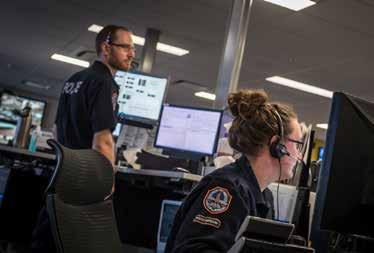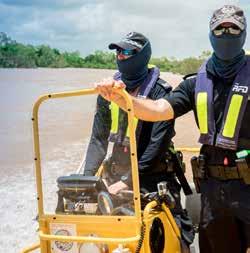
10 minute read
150th Anniversary: A series of epic journeys
A SERIES OF EPIC JOURNEYS

BY MARK MCADIE APM
Chairperson NT Police Museum and Historical Society
Charlotte Waters Telegraph Station
There was a string of telegraph stations at approximately 300-kilometres distance from each other between Palmerston and Adelaide by 1873.

But the telegraph stations were vulnerable. Less than a decade after John McDouall Stuart had cross the continent, the telegraph line had been surveyed and built. The telegraph stations, especially those in Central Australia were isolated in a way which is now difficult to conceive. By mid-1873 the Chief Secretary in SA wrote and George Hamilton, the Commissioner of Police agreed that it would be necessary to begin stationing Police at some of the Telegraph Stations, at least. On 19th July 1873, Charles Todd, the Postmaster General of South Australia wrote to the Chief Secretary alerting him to the spearing of a horse at Barrow Creek:
"This is the third horse speared at this station within a week. It will be necessary to take some steps to prevent these acts of aggression, otherwise, it is feared the natives will imagine our people are frightened of them and revert to bolder measures". 1

This report was forwarded to the Commissioner who responded (in part):
"Barrow Creek is about 700 miles 2 from the Blinman and there are no police stations nearer than the Blinman, but I am arranging to send a trooper when Mr. Todd starts a working party up in that direction which he intends to do very soon" 3 . On 18th August 1873, after some negotiations with the Superintendent of Telegraphs the Commissioner finally agreed to send a detachment of Troopers to some of the isolated Telegraph stations in the far north, one each to The Peake (1280 kilometres from Adelaide) Charlotte Waters (1600 kilometres from Adelaide) and Barrow Creek (2400 kilometres from Adelaide).
The Commissioner sent the following memo to the Chief Inspector of Police on 9th August -
“The Superintendent of Telegraphs is about to send by next Blinman Mail three Operators and Mr. Blood. A dray to carry food and swag will accompany them from the Blinman. One or two drays will be leaving Port Augusta on the arrival of the next steamer and could take personal luggage of troopers to be sent to the Peake, Charlotte Waters and Barrow Creek. The Chief Inspector of Police is requested to tell off three troopers for the above-named stations - they must be prepared to start with horses, kit, etc. early next week. Mr. Blood's party will wait one week at Beltana for the Troopers.” 4
1 .PCO 803/73 See also 624/73 2 .He cannot be correct on this; Blinman is about 500 kilometres from Adelaide and
Barrow Creek about 2400 kilometres from Adelaide so Barrow Creek is about 1900 kilometre or 1200 miles from Blinman. 3 .Ibid. 4 .P.C.O. 913/73 9/8/1873
Purchase your Challenge Coin today!




In celebration of 150 years of Policing in the Northern Territory, you can purchase the commemorative Challenge Coin.
Available from the Northern Territory Police Museum and Historical Society Inc.

$30
including presentation box, postage and handling.




Overland Telegraph Line
The three troopers assigned were Frederick Born who would serve at the Peake, William Workman who would serve at Charlotte Waters, and Samuel Gason who would serve at Barrow Creek. They made representations to the Commissioner that they should receive promotions, free rations and higher pay to compensate them for the clear privations of the duties they had been ordered to undertake. But the Commissioner was less than impressed, he thought their actions were:
"Subversive of all discipline. Those troopers must obey orders or they will be dismissed and not allowed to resign" 5 .
They said no more and packed their kits, saddled their horses and began their long journeys from Blinman in South Australia, their personal effects following on by dray.
These men were not to be a part of the Northern Territory detachment under the control of Foelsche, but a part of the South Australian Police Far Northern Division headquartered in Melrose in the Flinders Ranges, southeast of Port Augusta. It was to be a number of years before the Police Stationed at Charlotte Waters and Barrow Creek would come under Northern Territory control.

A Charlotte Waters journal entry shows that on December 5, 1873, Trooper Gason left this camp en route for Barrow Creek 6 . He arrived at Barrow Creek on February 16, 1874, with "horses in good order" 7 , an astonishing ride which would have passed on to legend in other places but was all in a day’s work for this Northern Territory policeman.
The exact date of their departure is not recorded
5 . PCO 913/73 9/8/183 6 . Charlotte Waters Police Journal 1873 7 . PCO 260/74
but would have been in mid-August 1873, Trooper Samuel Gason had ridden some 1900 kilometres in just under 6 months to get to Barrow Creek. To understand his journey, one needs to remember that he rode the last 600 kilometres on his own in the very harsh country in the middle of a Central Australian Summer where the mean January daytime temperature is 35.8 degrees Celsius. He also had to face the multiple tasks of having to find water both for himself and his horses, forage for food for himself and his horses and care for his horses by himself in a country that had very nearly defeated large well-supplied expeditions only a decade before. The journeys undertaken by Troopers Born and Workman are impressive themselves and only bettered by Gason’s feat of horsemanship. This astonishing ride would be a legend in other places but was just in a day's (or in this case many month’s) work for this Northern Territory Police Officer. His ride was not a singular event, as we will see. Trooper Gason's new post at Barrow Creek consisted of a substantial rectangular stone building with a galvanised iron roof and barred windows. Access to the building was through a large galvanised iron gate. Twenty metres around the building had been cleared up of bush to ensure there could be no surprise attack by Aborigines and to obtain a good field of fire in case there was. Beyond the clear area was dense scrub of bastard mulga and heavy undergrowth. The station, beautifully preserved today, lies at the foot of a red eroded hillock, a typical geological formation in the region.
NTPA’s legal services provider
l a w ye rs
The NTPA works in partnership with leading law firm Tindall Gask Bentley (TGB) to provide members with access to first class legal services.
Established in 1970, TGB has grown to become South Australia’s largest plaintiff law firm and has now expanded to Northern Territory and Western Australia. The firm offers a full range of legal services.
We also offer a 10% discount on any legal fees for:
• Workers Compensation, • Motor Vehicle Accident Compensation, • Family and Divorce law, • Estates and Estate Planning (including Wills), • Business and Property, • Criminal and Disciplinary.

To book an appointment with a lawyer or for more information please contact the NTPA office 08 8995 9520 or email ntpa.tgb.legalservices@ntpa.com.au
WHEN HOME IS NOT A HAVEN
It’s a day by day ritual of walking on eggshells to keep the peace and never knowing what slightest act or word will trigger a violent response. Practising in family law I have helped a number of clients who have walked into my office terrified for their safety and that of their children or others they care for including pets and elderly relatives. They walk in feeling powerless and without options to escape. They tell me of the threats to their safety and those they love if they contemplate changing their situation. They have shared with me the daily challenge of keeping children quiet and out of sight so as not to provoke an angry, tired or intoxicated partner. Almost universally they recount being shut off from family and friends and barely having enough money to pay for groceries and petrol. Who they can see and what they can spend and do is restricted. They speak of the mileage on their vehicles and their telephones being monitored. For them isolation has been a long-lived experience to the point they are scared to break free from the control. Usually they have no or very little knowledge of their financial position and have no access to bank accounts. Rarely are assets held in their names and if they are then they usually do not know it. On several occasions I have done a property search to ascertain ownership of assets and had a client on the opposite side of my desk stare back at me incredulous that they actually either own property in their sole name (presumably brought about for asset protection purposes often by a self-employed partner) or jointly with another. Often if they have mustered the courage to want to separate from an abusive partner, they believe they are on their own in the process and often they are concerned they will not have money to survive or the means to rehouse themselves and their children. It has been reassuring for them to hear that there are people to assist and ways to obtain financial support including: 1. Police are only a telephone call away to assist in an emergency. In some circumstances a violent party will be removed from the home leaving the other party and children to remain living in the home protected by an intervention order that prevents the other party returning to the home; 2. In limited circumstances, with the assistance of a lawyer, an intervention order can be obtained privately; 3. There are shelters and community services that provide relief including financial and housing on a temporary (short or long term) basis to enable a person/family at risk to immediately move out of unsafe environment; 4. Applying to government agencies including Centrelink to have eligibility assessed for pensions, rent assistance and financial support with living, health and education expenses; 5. Applying for child support through the child support agency (Department of Human Services). Access the child support agency’s online calculator at www.csa.gov.au to see what child support may be assessed payable; and 6. Making applications for interim lump sums of money and/or transfers of property and, if the circumstances permit, payments of spousal maintenance. These are often complex applications and legal advice should be obtained from a specialist family lawyer before going down this path. If you are in a position of fearing for your and your family’s safety or if you want help to make arrangements for the future care arrangements for children and/or to effect a property settlement our team of experienced lawyers are here to work with you to help you.
For most of us our homes are where we feel safe and secure. For others home is a hostile place where safety is not a certainty and where protecting oneself and family is a daily struggle.
BY WENDY BARRY
Family Law Partner
We will look after you with respect and care and your information will be treated confidentially and discreetly. Please take advantage of our free first appointment by calling 8941 7814. NTPA’s legal services provider
l a w ye rs
The firm offers a full range of legal services.
Receive 20 minutes free preliminary advice on all legal matters.
FOR URGENT ASSISTANCE FROM OUR ASSOCIATION
NTPA OFFICE HOURS PHONE 08 8995 9520
NTPA AFTER HOURS MOBILE 0497 750 025
N O R THER N TER R ITO R Y POLICE ASSOCIATION






